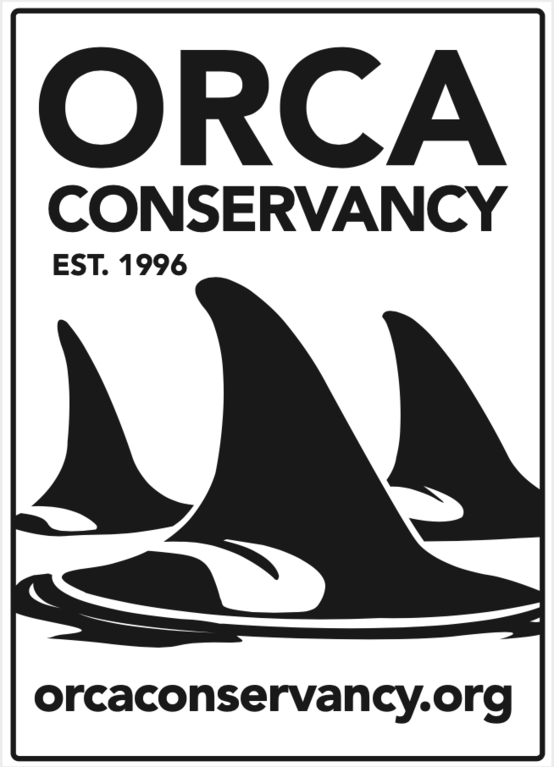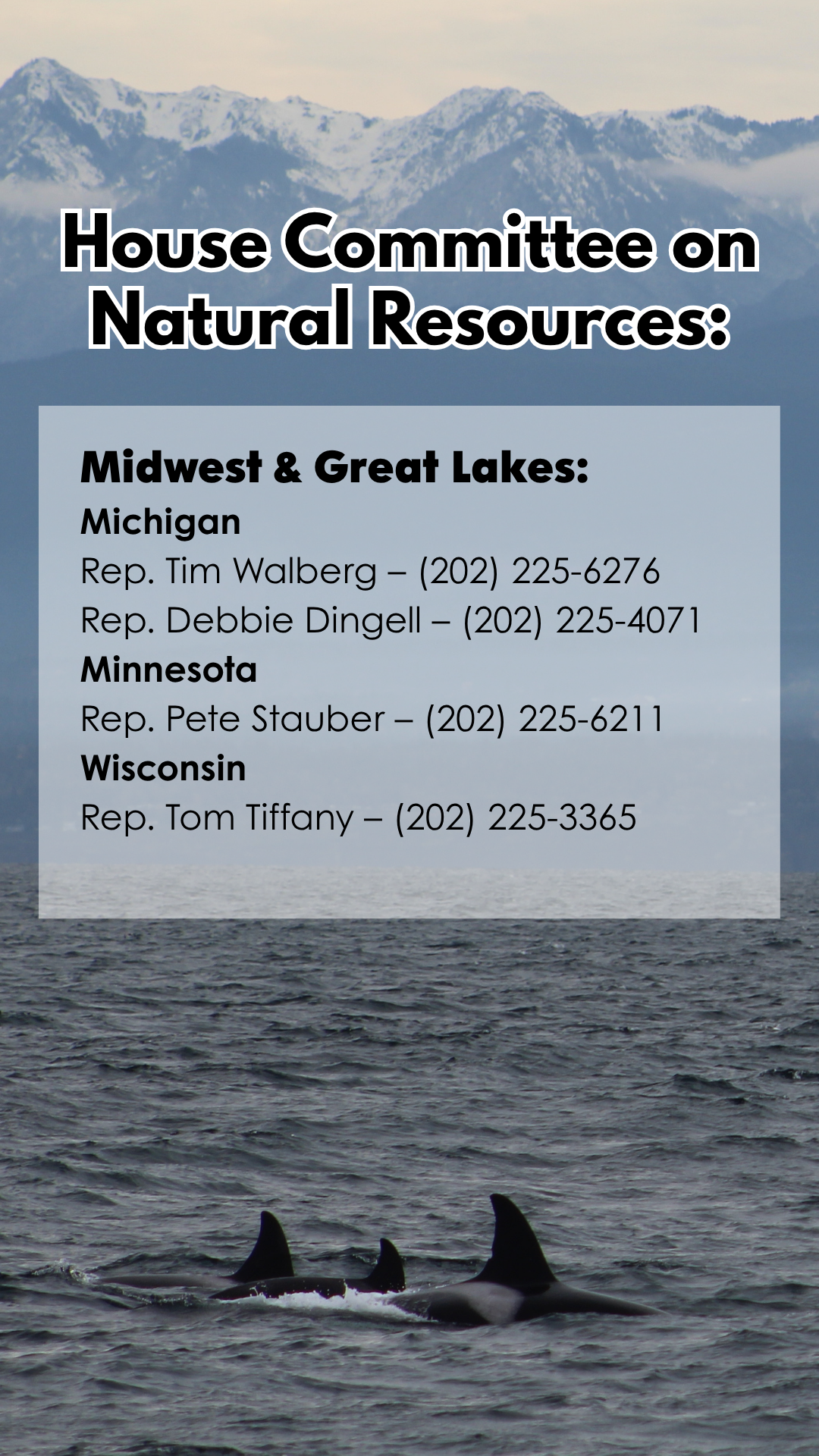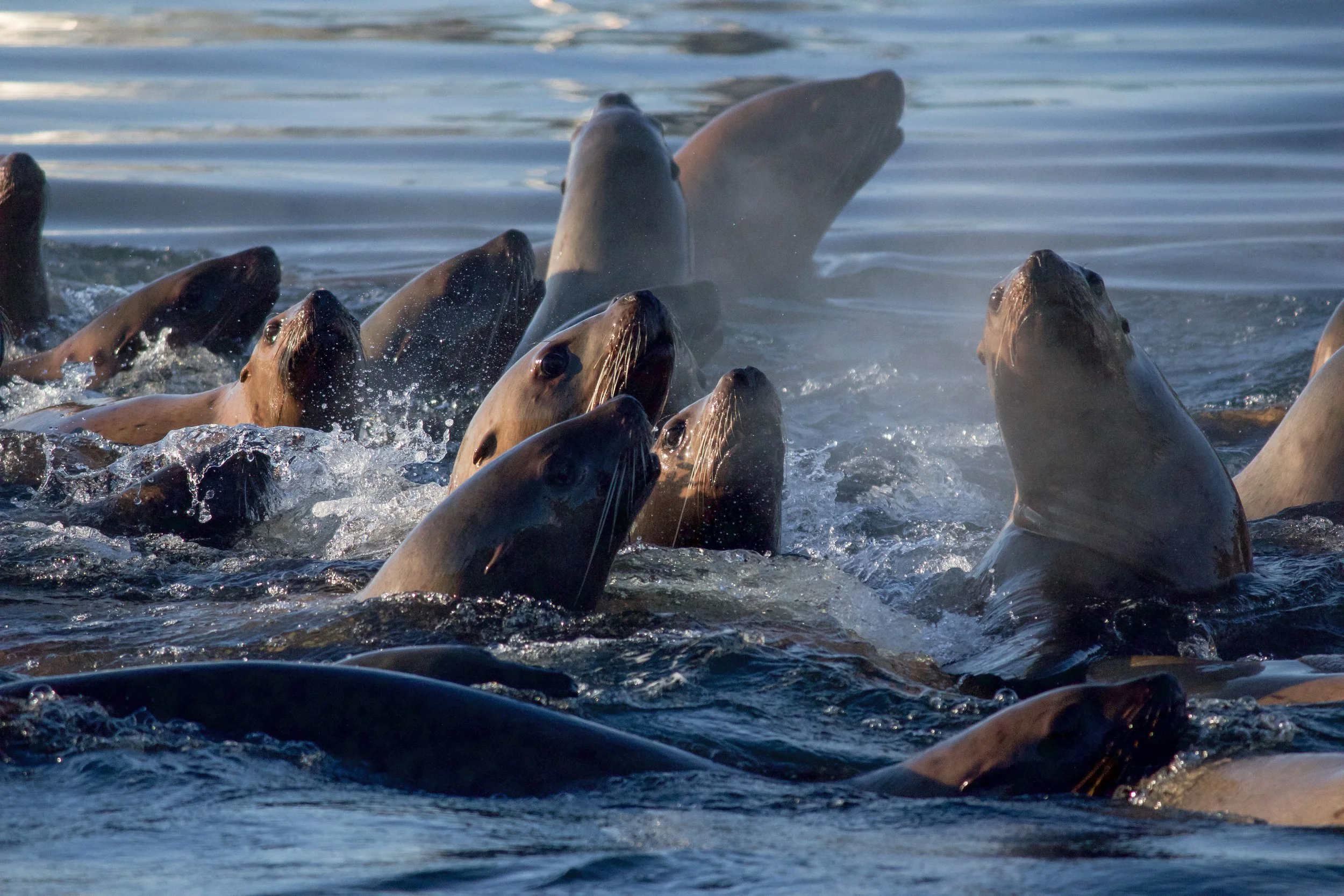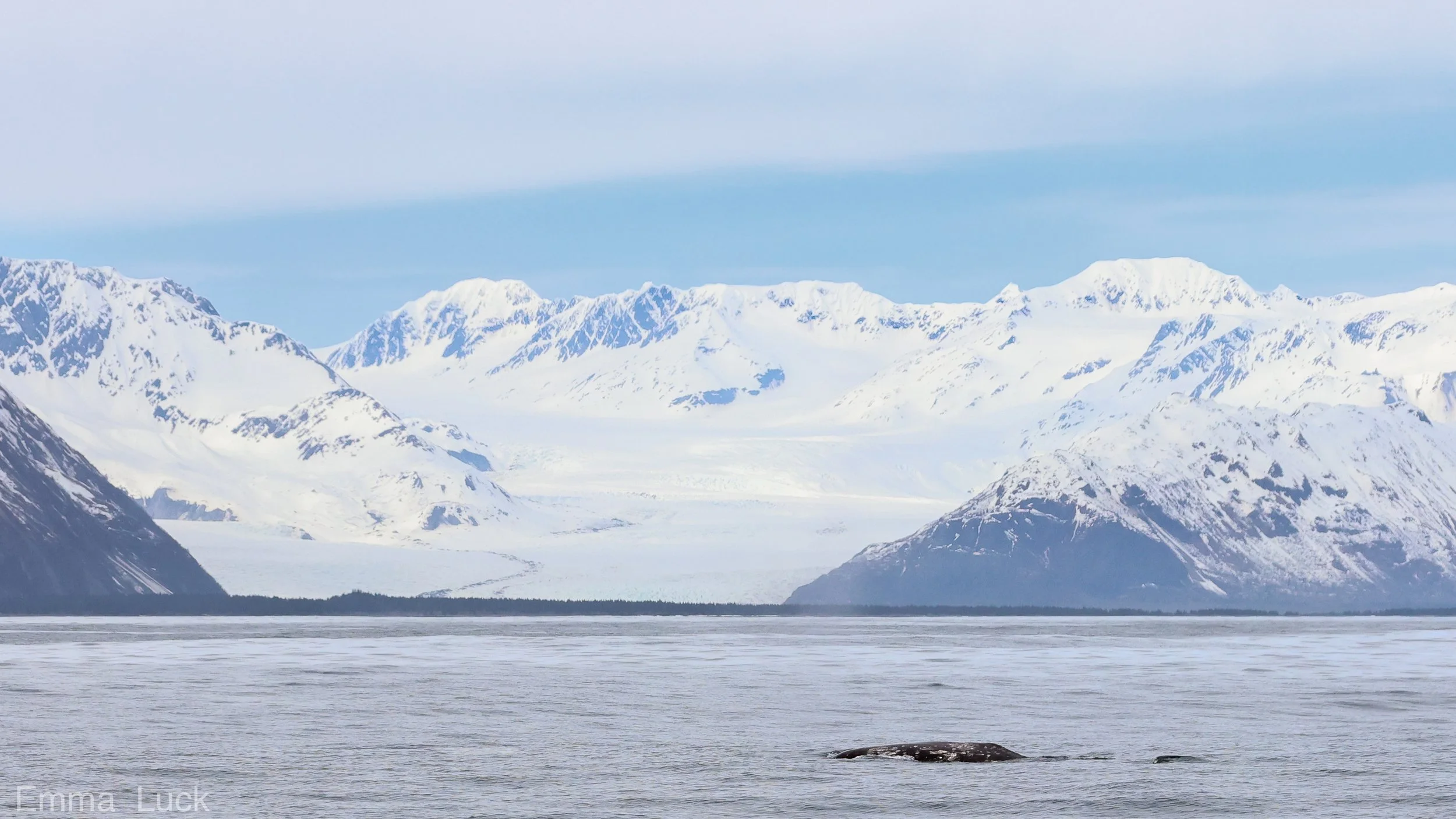ACTION ALERT: Protect the Marine Mammal Protection Act
Alaskan Residents: Contact Congressman Nick Begich (R-AK) directly to oppose his draft bill amending the Marine Mammal Protection Act that aims to weaken protections.
Non-Alaskan Residents: Contact your representatives and urge them not to support the proposed amendments.
Due before July 22nd - House Natural Resources Committee Hearing Date
AD22 Skana -an Alaska Resident killer whale and member of the AD8 Pod. Photo by Emma Luck
What is happening and why it matters?
On July 8, 2025, Congressman Nick Begich (R-AK) introduced a draft bill amending the Marine Mammal Protection Act (MMPA), the landmark federal legislation that has guided marine resource management and conservation in the United States for over fifty years.
Congressman Begich’s bill would mandate significant changes to marine mammal management in this country, stripping back protections for keystone species and removing fundamental scientific concepts from federal language to support the expansion of harmful extractive activities, like oil and gas extraction, in U.S. waters.
Congressman Begich’s proposed amendment would:
Dismantle the current legal standards for authorizing takes (hunt, capture, harass, kill of marine mammals) and allow for automatic approval for take permits
Not require agencies to ensure “negligible impact”
Agencies will be stripped of their authority to require mitigation processes around takes and issuing protective regulations
Downgrade conservation goals by only ensuring survival and not maintaining a healthy population
Removes safeguards for commercial fishing and downgrades the “zero bycatch goal” to a “near-zero bycatch goal”
Strike down protections for poorly-known populations
Eliminate best-practice precautionary approaches backed by decades of science
Constrain the federal definition of ‘harassment’ so that it no longer prohibits actions with the potential to harm marine mammals
Require unreasonable or impossible data to estimate population abundances and design best practices for management
How will this impact orcas and other species?
These changes would decimate federal protection for threatened and endangered populations of marine mammals, including orcas, by walking back decades of stewardship and conservation in favor of destructive exploitation.
The MMPA directly mandates the sustainable management and protection of the critically endangered Southern Resident killer whales (SRKWs), their habitat, and their prey throughout U.S. waters. Under the proposed changes, marine mammals, including SRKWs, would no longer be protected from activities with high potential for disruption or injury.
Image: Members of the AT1s. Photo by Emma Luck
The AT1s: A Cautionary Tale:
The AT1 killer whale population, a unique group of mammal-eating orcas in Prince William Sound, was devastated by the Exxon Valdez oil spill in 1989. Declared depleted under the MMPA, this population has seen no births since 1984 and is now functionally extinct. Their collapse shows what can happen when protections fail or come too late. Strong, science-driven safeguards like those in the MMPA are essential to prevent other vulnerable populations, like the Southern Residents, from meeting the same fate.
How to Oppose the Draft Bill:
Alaskan Residents:
Call the office of Congressman Begich and oppose the amendments and draft bill (see suggested talking points below).
Please note: calling is more effective than emailing, calls are more likely to be logged and shared with the Congressman, and taken into account when shaping his position.
Congressman Begich Contact Information:
Anchorage Office: (907)921-6575
Washington DC Office: (202)225-5765
Non-Alaskan Residents:
While Congressman Begich represents Alaska, the Marine Mammal Protection Act applies nationwide, and its weakening would have serious consequences for marine ecosystems and coastal economies across the country.
If you live outside of Alaska, you can still make your voice heard by calling your Representative and Senators to express concern about this proposal. Let them know you oppose any effort to weaken marine mammal protections and urge them to defend the integrity of the MMPA. Use the links below to find your representatives and how to contact them.
Members of the House Natural Resources Committee:
Tips for Calling Your Representative:
Be respectful and polite in your comments, emails, or phone calls.
Get personal, share your experiences, and explain why you care. Personal messages carry more sentiment and weight, which are more meaningful and can have a bigger impact on policymakers.
Avoid pre-written scripts and copy-and-paste templates. New practices make it so that pre-written templates only get counted once. Meaning if multiple people submit the same comment, letter, or email, it will only be recorded once. Make it personal and unique to make sure it is counted.
Cite resources and relevant data that support your comment. Scientific publications referenced in public comments MUST be addressed by policymakers and make for a strong public comment.
Suggested talking points:
The Marine Mammal Protection Act (MMPA) is a cornerstone of U.S. environmental law and has been a global model for marine conservation. Weakening it would set a dangerous precedent domestically and internationally.
The MMPA has been instrumental in the recovery of several marine mammal populations. On the U.S. West Coast, sea lions, harbor seals, and other pinnipeds have rebounded significantly since the Act’s passage in 1972. This recovery has directly benefited Transient/Bigg’s killer whales (mammal-eating population). Their numbers have steadily increased in recent decades, thanks in large part to the protections and recovery of their prey species under the MMPA.
Marine mammals, including whales, dolphins, sea lions, and seals, play essential roles in the health of marine ecosystems that support fisheries, carbon cycling, and coastal economies across the entire U.S., not just Alaska.
Steller sea lion aggregation in Alasak. Photo by Emma Luck
Many marine mammals migrate through U.S. waters and play key roles in ecosystems across the country. Their health affects everything from food webs to ocean stability, and their presence reflects the overall well-being of marine environments we all rely on, including the communities, Tribes, and economies that depend on them.
The proposed bill undermines science-based management by requiring unattainable data thresholds before protections can be enacted. This ignores decades of research and opens the door to exploitation, not only harming wildlife but also the communities and future generations that depend on these resources.
These amendments threaten the MMPA’s long-standing use of the “precautionary principle,” which is a fundamental safeguard when managing wildlife with incomplete data, as is the case with many Alaskan orca and cetacean populations.
Weakening harassment definitions would allow more noise, vessel disturbance, and industrial disruption in habitats already under pressure, from the Gulf of Mexico to the Pacific Northwest.
This draft bill is part of a broader trend to roll back environmental safeguards under the guise of “streamlining.” These changes benefit short-term industry interests at the expense of long-term ecological and economic health.
If this bill advances, it could impact how marine mammal protections are handled in other legislation and permitting decisions, from offshore drilling to Navy sonar use to renewable energy siting.
Language in the amendments, such as downgrading commercial fishing bycatch goals to”near-zero,” is intentionally ambiguous and creates a goal that can be open to individual interpretation and exploitation.
Scientific Resources:
Return of the harbor seal: The influence of the Marine Mammal Protection Act on coastal ecosystems.
Jeffries, S. J., et al. (2021). Washington Department of Fish and Wildlife Report.
Key Point: Since the MMPA’s enactment in 1972, many pinniped populations, once severely depleted, have rebounded dramatically, playing vital roles in nearshore marine ecosystems.
https://wdfw.wa.gov/sites/default/files/publications/02579/wdfw02579.pdfKiller Whale Use of the Inside Waters of Vancouver Island, British Columbia
Scarff, Taryn M., 2024
Key Point: The increasing presence of transients in the Salish Sea is closely tied to the recovery of pinniped populations, which began rebounding after protections like the U.S. MMPA and Canada’s marine mammal bans in the 1970s. This highlights a clear predator–prey recovery dynamic.
https://open.library.ubc.ca/soa/cIRcle/collections/ubctheses/24/items/1.0441015The Marine Mammal Protection Act at 40: Status, Recovery, and Future of U.S. Marine Mammals
Joe Roman, Irit Altman, Meagan M. Dunphy-Daly, Caitlin Campbell, Michael Jasny, and Andrew J. Read, 2013
Key Point: The MMPA has contributed to measurable recovery in many U.S. marine mammal populations, with more stocks increasing than declining. Species like northern elephant seals, gray whales, and Bigg’s killer whales have rebounded significantly under the Act’s protections. The paper highlights the MMPA as a global model for marine conservation, while also noting the need for continued support and modernized tools to address emerging threats.
https://www.researchgate.net/publication/236006172_The_Marine_Mammal_Protection_Act_at_40_Status_recovery_and_future_of_US_marine_mammals
Grey whale surfacing in front of Alaskan mountain range. Taken by Emma Luck
Donate










